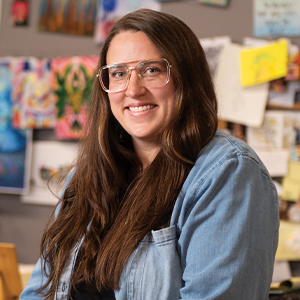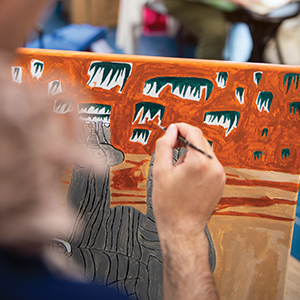Artist Arthur Smith painted the stylized ship in the Momentum studio space at Mainframe Studios.
Writer: Lisa Rossi
Photographer: Duane Tinkey
It’s been a year since artist Katie Gazzo stumbled upon the Momentum arts program, which provides free studio space and supplies in Mainframe Studios to anyone with a mental health condition or a disability.
Since then, Gazzo, 29, has exhibited her artwork in Momentum’s annual juried art show, “Works of Growth and Recovery,” helped paint a collaborative mural in the downtown skywalk, joined the Des Moines Art Center’s education programs as a community access teacher, spoken at events and organized her own art shows. It’s been quite a year.
Gazzo grew up in the foster care system and has been open about her own struggles with mental health and other challenges. She now proudly identifies as a multifaceted artist in acrylics, mixed-media collages and found-object art.
She wishes more people knew about Momentum’s transformative power. “It’s a catalyst for people to become whatever they want to be in the world of creativity,” she said. “Nothing about their disability or background or socioeconomic status will stop them from being successful.”
Momentum is a nonprofit arts program of Community Support Advocates, a social services organization that supports people with mental health issues and disabilities.
The program started 20 years ago and has opened new opportunities for artists of all abilities.

“When people think of disabled artists, they think we are coloring with crayons or fingerpainting or doing coloring books,” said Kelsey Burr, Momentum’s program coordinator. “I don’t think people realize the value of disabled artists and disabled art until they come here and they see it and they are like, ‘Oh, OK, I understand it now.’ It’s just as valuable as any other art and it has a whole story behind it.”
Community Support Advocates CEO Christina Smith launched the program in 2004 when she was working with a couple of really good artists. One man, in particular, provided the spark of inspiration. He struggled with paranoia but loved to make art with chalk and other materials.
“My job was to check on him a couple of times a week to help him move forward,” Smith said. “I wondered if we had something for him to get excited about.”
With this in mind, Smith organized an exhibition to showcase work by artists with disabilities. A local artist juried the show, which featured eight artists and attracted about 75 visitors.
“I got the gentleman excited about creating,” she recalled. He hadn’t been leaving the house at that point, but he came to the show. “That would be the momentum for his mental health recovery. He saw himself as an artist and not someone who is sick. He went back to school, back to work, and within the next 10 years, his life drastically changed.”
In 2017, Momentum took up residence at Mainframe Studios, where it increased its visibility and popularity. The program quickly outgrew its original studio and graduated in 2020 into the larger space it’s in now, which includes both a studio and a gallery.
“The studio space is open to anybody who identifies with having a disability or a mental health condition,” Burr said. “I don’t require any type of paperwork or diagnosis. I don’t need a doctor’s note. It can be something as simple as anxiety or depression, and it’s really just about the healing and growth of art and the making of art and how it can connect people. It’s become a really awesome, supportive, inclusive community of artists who come in and learn how to cope with their own traumas and barriers.”
The umbrella organization, Community Support Advocates, recently moved its headquarters to 1516 Valley West Drive in West Des Moines. The new space also includes a gallery where all the artwork on display is made by an artist with a mental health condition or disability. A mix of artwork by Momentum artists rotates on a monthly basis.
Momentum runs “super lean,” Smith said, and Burr is the only staff member — for now. Both Smith and Burr hope Momentum can expand in the future to serve even more people than the 40 or 50 artists who currently come in on any given week.
Kelly Ostdiek is a Momentum volunteer, as well as a painter. She first came in as a caregiver, helping a client with autism.
“I was kind of shy at first at getting involved and doing my own thing, but eventually I was like, ‘I have anxiety and ADHD. This place could be for me, too,’” she said. “So I started doing my own artwork and built the volunteer position for myself. It’s a nice place to come and just talk. Everybody is welcome, so it kind of reduces that stigma by just being welcoming to everybody.”

Artwork by Jack Marren

Open studio sessions at Mainframe Studios, where artists have space to get creative.












